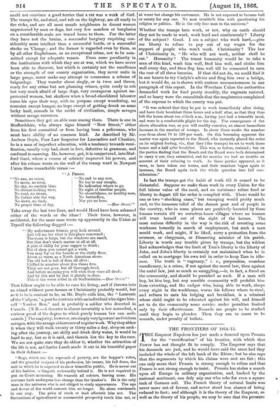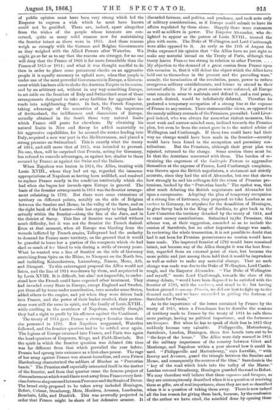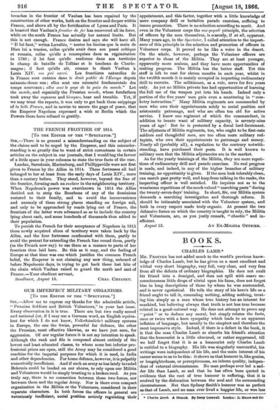THE FRONTIERS OF 1814-15.
THE Emperor Napoleon has just made a demand upon Prussia for the "rectification" of his frontier, with which that Power has not thought fit to comply. The Emperor says that his demands are just, and he would have said the same had they included the whole of the left bank of the Rhine ; but he also says that the arguments by which his claims were met are fair ; this can only mean that Prussia is strong enough to refuse and that France is not strong enough to insist. Prussia has stolen a march upon all Europe in military organization, and, backed by the national sentiment, can defy any one who asks for even a square inch of German soil. The French theory of natural limits was never more out of favour, and never stood less chance of being reduced to fact ; and although it is the theory of the Emperor, as well as the theory of his people, we may be sure that the pressure of public opinion must have been very strong which led the Emperor to express a wish which he must have known could not be gratified. There are, indeed, apart altogether
from the wishes of the people whose interests are con- cerned, quite as many solid reasons now for maintaining the frontier intact as there were in 1815. And those reasons weigh as strongly with the German and Belgian Governments as they weighed with the Allied Powers after Waterloo. We might go so far as to say that the reasons are stronger, for no one will deny that the France of 1866 is far more formidable than the France of 1815 or 1814 ; and what it was thought needful to do then in order to place some permanent checks on an aggressive people it is equally necessary to uphold now, when that people is under one of the most powerful Governments in Europe, a Govern- ment which has been able to shake the Austrian Empire to its centre, and by an arbitrary act, without in any way consulting Europe, to set aside on the frontiers of Italy and Switzerland some of those arrangements designed to take away facilities for aggressive in- roads into neighbouring States. In fact, the French Emperor, taking advantage of the necessities of Italy, the impotence of Switzerland, the indifference and dissensions of Europe, actually obtained in the South those very natural limits which France still pants for elsewhere. By obtaining his natural limits in Nice and Savoy lie added materially to his aggressive capabilities, for he secured the routes leading into Italy, acquired a new war port in the Mediterranean, and placed a strong pressure on Switzerland. This is exactly what the treaty of 1814, and still more that of 1815, was intended to prevent. No one, then, will be surprised that Prussia, acting for Germany, has refused to concede advantages, as against her, similar to those secured by France as against the Swiss and the Italians.
When Napoleon was beaten in 1814, the Allies, treating with Louis XVIII., whom they had set up, regarded the immense appropriations of Napoleon as having been nullified, and resolved to replace France nearly in the condition territorially which she had when she began her inroads upon Europe in general. The basis of the frontier arrangement in 1814 was the frontier arrange- ment subsisting in 1792. But there were some extensions of territory on different points, notably on the side of Belgium between the Sambre and Meuse, in the valley of the Sarre, and on the right bank of the Lauter—this last expressly to bring Landau actually within the frontier—along the line of the Jura, and in the district of Savoy. This line of frontier was settled without
much difficulty, but it was not the frontier the French desired. Even at that moment, when all Europe was bleeding from the
wounds inflicted by French armies, Talleyrand had the audacity to demand for France more territory, on the ground that it would be graceful to leave her a portion of the conquests which she had shed so much of her blood to win during a strife of twenty years.
What he wanted was a line of frontier on the side of Germany stretching from Spire on the Rhine, to Nieuport on the North Sea, and including Kaiserslautern, Luxemburg, Namur, Mons, Ath, and Nieuport. To this extravagant proposal the Allies would not listen, and the line of 1814 was drawn by them, and acquiesced in by Louis XVIII. It is difficult, but alas! not impossible, to under- stand how the French could have expected other treatment. They had invaded every State in Europe, except England and Sweden, put them all by turns under contribution, torn asunder some States, added others to the empire, and yet when they were driven back into France, and the power of their leader crushed, their preten- sions were still the same in spirit, and the family of Louis XVIII., while exulting in the overthrow of Napoleon, actually thought they had a right to profit by his offences against the Continent.
The treaty of 1814 gave France a stronger frontier than that she possessed in 1792. But Napoleon reappeared, Waterloo followed, and the frontier question had to be settled over again.
The legions of Europe swarmed into France, and Paris was again the head-quarters of Emperors, Kings, and Field-Marshals. But the spirit in which the frontier question was debated this time was far different from that which prevailed the year before. Prussia had sprung into existence as a first-class power. The rage of her army against France was almost boundless, and even Prince Hardenburg characterized the soldiers of Blucher as " Praetorian bands." The Prussian staff especially interested itself in the Matter of the frontier, and from that quarter came the famous project of dismemberment which would have rent away from France every first- class fortress she possessed between Provence and the Straits of Dover. The broad strip proposed to be taken away included Huningen, Befort, Colmar, Strasbourg, Metz, Mezieres, Avesnes, Landrecies, Bouchain, Lille, and Dunkirk. This was avowedly projected in order that France might be shorn of her defensive armour, It discarded fairness, and politics, and prudence, and took note only of military considerations, as if Europe could submit to have its affairs regulated by them alone. Happily there were statesmen as well as soldiers in power. The Emperor Alexander, who de- lighted to appear as the patron of Louis XVIII., treated the plan with scorn. The Duke of Wellington and Lord Castlereagh were alike opposed to it. As early as the 11th of August the Duke expressed his opinion that "the Allies have no just right to make any material inroad on the Treaty of Paris, although that treaty leaves France too strong in relation to other Powers. . . . My objection to the demand of a great cession from France upon this occasion is, that it will defeat the object which the Allies have held out to themselves in the present and the preceding wars," namely, the termination of the revolution, peace, power to reduce overgrown military establishments, and leisure to attend to their internal affairs. For if a great cession were enforced, all Europe must remain in arms to maintain and defend it, and a real peace, so much desired, would be indefinitely deferred. Therefore he preferred a temporary occupation of a strong line at the expense of France to any cession. These statesmanlike views, so opposed to the merely military counsels of the Prussians, prevailed. Lord Liver- pool indeed, who was always for somewhat violent measures, like most weak and narrow-minded men, inclined towards the Prussian plan, but even he from the outset gave in to the united advice of Wellington and Castlereagh. If these two could have had their way no change would have been made in the frontier—security would have been found in the occupation and pecuniary con-
tributions. But the Prussians, although their great plan was rejected, returned to the charge. Some cession there must be. In that the Austrians concurred with them. The burden of re- straining the eagerness of the limitrophe Powers to aggrandize themselves at the expense of France, Lord Castlereagh complains, was thrown upon the British negotiators, a statement not strictly accurate, since they had the aid of Alexander, but one that shows how strongly he and his colleague felt the stress of Prussian pre- tensions, backed by the " Praetorian bands." The upshot was, that after much debating the British negotiators and Alexander hit upon a compromise. Adopting the plan of temporary occupation of a strong line of fortresses, they proposed to take Landau as an enclave in Germany, to stipulate for the demolition of Huningen, to give Savoy back to the King of Sardinia, to give back to the Low Countries the territory detached by the treaty of 1814, and to exact money contributions. Submitted to...the Prussians, this scheme was, at their suggestion, amended so as to include the cession of Sarrelouis, but no other important change was made. In reviewing the whole transaction, it is not possible to doubt that had it not been for Prussian perseverance no cession would have been made. The improved frontier of 1792 would have remained intact, not because any of the Allies thought it was the best fron- tier, regarded from an external point of view, but because the more politic and just among them held that it would be imprudent as well as unfair to make any material change. That no such change was made was due to the Duke of Wellington, Lord Castle- reagh, and the Emperor Alexander. "'rho Duke of Wellington and myself," wrote Lord Castlereagh, towards the close of this stormy debate, " would have been disposed to be satisfied with the frontier of 1790, with the enclaves, and stood to it ; but having broken ground to manage Prussia, we did our best to fight up to the demand made, and we have succeeded in getting the fortress of Sarrelouis for Prussia."
As to the importance of the losses sustained by France by the treaty of 1815, when a Frenchman has to describe the cessions of territory made to France by the treaty of 1814 he calls them. mere parings, having no political importance, and the fortresses are bicoques. But when he has to speak of their loss in 1815 they
suddenly become very valuable. Philippeville, Marienbourg, Sarrelouis, Landau, Huningen, these five hovels turn out to be " the keys of the house." The Allies were duly warned in 1814 of the military importance of the country between Givet and Maubeuge, and Napoleon within a year showed how it could be used. " Philippeville and Marienbourg," Bays Lavallee, " with Rocroy and Avesnes, guard the triangle between the Sambre and Meuse, and consequently the sources of the Oise." Sarrelouis is the " key of the road which leads into the valley of the Marne." Landau covered Strasbourg, Huningen guarded the road to Befort. We may therefore well believe that these rognures and bicoques, as they are contemptuously described when it is a question of receiving them as gifts, are of real importance, since they are not so described when it is a question of taking them away. There is now indeed all the less reason for giving them back, because, by the confession of the author we have cited, the mischief done by opening those breaches in the frontier of Vauban has been repaired by the construction of other works, both on the frontier and deeper within France, and above all by the fortification of Lyons and Paris. It is boasted that Vauban's frontier de fer has recovered all its force, while on the south France has actually her natural limits. But this is not enough. France desires and says she will have all. " Il lui faut," writes Lavallee, " toutes les limites que la main de Dieu lui a trace'es, celles qu'elle avait dans son passe celtique et romain, celles qu'elle a reconquises dans sa regeneration in 1789 ; it lui faut qu'elle renferme dans son territoire le champ de bataille de Tolbiac et le tombeau de Charle- magne ; it faut qu'elle sit, comme le disait Vauban a Louis XIV. son pre cared Lea frontieres naturelles de la France sont entrées dans le droit public de l'Europe depuis soixante-douze area; elles sont une necessite fondamentale des temps nouveaux ; elles sont is gage de la pair du monde." Let the monde, and especially the Prussian monde, whose forefathers took away the rognures and bicoques, hear and tremble. Yet, if we may trust the reports, it was only to get back these snippings of la belle France, and in nowise to secure the gage of peace, that the Emperor Napoleon expressed a wish at Berlin which the Powers there have refused to gratify.
































 Previous page
Previous page